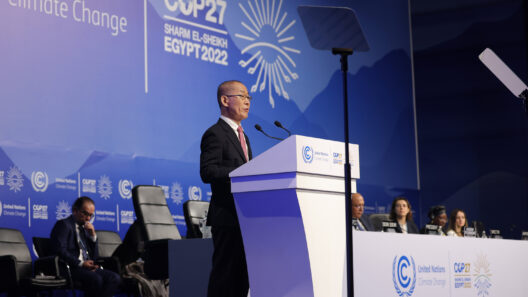Global warming, an ominous specter looming over our planet, demands immediate action and innovative strategies to mitigate its far-reaching effects. The scientific consensus underscores that human activities, primarily the combustion of fossil fuels and deforestation, are major contributors to the greenhouse gas emissions driving climate change. However, a plethora of proven strategies can effectively slow down this phenomenon, offering hope and urgency in equal measure. It is crucial for individuals, businesses, and governments to engage in tangible actions that promise to alter our trajectory toward a more sustainable future.
To begin with, renewable energy adoption stands as one of the most pivotal strategies. Transitioning from fossil fuels to renewable sources such as solar, wind, and hydropower not only eradicates the dependence on carbon-emitting energy but also democratizes energy production. Solar photovoltaics, for instance, have surged in popularity due to decreasing costs and technological advancements. Investing in infrastructure for wind and solar energy can create jobs, foster local economies, and result in cleaner air and healthier communities. Transitioning energy systems is a colossal endeavor but one that is increasingly feasible through collaborative policies and financial incentives.
In conjunction with energy transition, promoting energy efficiency is essential. Upgrading buildings and industrial processes to be more energy-efficient can lead to significant reductions in energy consumption. Simple measures—like insulating homes, utilizing LED lighting, and modernizing appliances—can yield substantial benefits. The implementation of stringent energy codes and standards can act as a catalyst for widespread efficiency improvements across various sectors. By making energy conservation a priority, we can simultaneously lower emissions and reduce operating costs, creating a win-win scenario for both the environment and the economy.
Another imperative strategy involves reforestation and forest preservation. Trees function as carbon sinks, sequestering vast amounts of CO2 from the atmosphere. Initiatives aimed at restoring degraded landscapes, reforesting urban environments, and preserving existing forests can significantly bolster biodiversity while combating climate change. Additionally, sustainable land-use practices can enhance soil carbon storage, offering a dual benefit of preserving agricultural productivity while contributing to global warming cessation efforts. Countries across the globe have begun to recognize the pivotal role of forests, making commitments to protect and expand their forest cover.
Transitioning to sustainable agriculture is equally crucial in our quest to combat climate change. Agricultural practices that prioritize ecological balance can mitigate the sector’s considerable contributions to greenhouse gas emissions. Techniques such as agroecology, permaculture, and regenerative farming practices not only enhance food security but also promote biodiversity and restore soil health. By reducing reliance on synthetic fertilizers and pesticides, farmers can minimize emissions while fostering resilient ecosystems. Supporting local and organic food systems can also mitigate transport-related emissions, making direct contributions to slowing global warming.
Furthermore, transportation electrification is a vital aspect of reducing carbon footprints. Promoting the use of electric vehicles (EVs) and investing in charging infrastructure can dramatically decrease reliance on fossil fuels. As battery technology continues to advance and become more affordable, the transition to EVs will become even more practical for the average consumer. Policy measures such as subsidies, tax incentives, and stringent fuel-efficiency standards can accelerate the shift toward an electrified transportation system. Additionally, encouraging public transit and promoting cycling infrastructure can significantly reduce emissions from personal vehicles.
The role of corporate responsibility cannot be overlooked. Businesses must assume accountability for their environmental impact and actively seek to reduce their carbon footprints. Implementing sustainability initiatives, like waste reduction, water conservation, and supply chain optimization, can distinguish forward-thinking companies in an increasingly eco-conscious market. Transparent reporting on environmental performance, alongside attainable sustainability goals, can cultivate consumer trust and promote a culture of corporate stewardship. Stakeholders demand a transition toward environmentally responsible practices, and companies that adapt will not only thrive but also catalyze wider societal change.
On a larger scale, international cooperation plays an integral role in addressing climate change. The interconnectedness of global ecosystems underscores the necessity for collective action, transcending geopolitical disagreements. The Paris Agreement stands as a testament to the potential for nations to unify under a common cause. By setting ambitious targets and sharing resources and technologies, countries can forge paths toward sustainability that are both equitable and effective. Enhanced collaboration can lead to the development of innovative solutions, fostering resilience against climate impacts.
In addition to these strategies, engaging communities through education and awareness is imperative. Empowering individuals with knowledge about climate change and actionable ways to mitigate its effects can lead to grassroots movements that demand change. Educational programs in schools and community organizations can ignite a shift in perspective, nurturing a generation of ecologically-minded citizens who prioritize sustainability. Disseminating information and promoting dialogue can mobilize communities, amplifying collective efforts toward combating global warming.
To conclude, the urgency of the climate crisis compels a multifaceted approach incorporating renewable energy adoption, energy efficiency, reforestation, sustainable agriculture, transportation electrification, corporate responsibility, international cooperation, and community engagement. Each strategy underscores the reality that slowing down global warming is not only feasible but imperative. As the stakes continue to rise, embracing these proven solutions paves the way toward a resilient, sustainable future. It is incumbent upon all of us—individuals, governments, and organizations—to heed this pressing call to action and mold a world where environmental harmony prevails.






